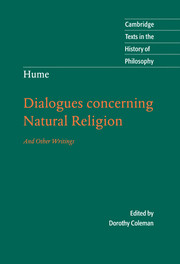Book contents
- Frontmatter
- Contents
- Acknowledgments
- Introduction
- Chronology
- Further reading
- Note on the text
- List of abbreviations
- DIALOGUES CONCERNING NATURAL RELIGION
- Pamphilus to Hermippus
- Part 1
- Part 2
- Part 3
- Part 4
- Part 5
- Part 6
- Part 7
- Part 8
- Part 9
- Part 10
- Part 11
- Part 12
- OTHER WRITINGS
- Index
- Cambridge Texts in the History of Philosophy
Part 2
Published online by Cambridge University Press: 05 June 2012
- Frontmatter
- Contents
- Acknowledgments
- Introduction
- Chronology
- Further reading
- Note on the text
- List of abbreviations
- DIALOGUES CONCERNING NATURAL RELIGION
- Pamphilus to Hermippus
- Part 1
- Part 2
- Part 3
- Part 4
- Part 5
- Part 6
- Part 7
- Part 8
- Part 9
- Part 10
- Part 11
- Part 12
- OTHER WRITINGS
- Index
- Cambridge Texts in the History of Philosophy
Summary
1 I must own, Cleanthes, said Demea, that nothing can more surprise me, than the light, in which you have, all along, put this argument. By the whole tenor of your discourse, one would imagine that you were maintaining the being of a God, against the cavils of atheists and infidels; and were necessitated to become a champion for that fundamental principle of all religion. But this, I hope, is not, by any means, a question among us. No man; no man, at least, of common sense, I am persuaded, ever entertained a serious doubt with regard to a truth so certain and self-evident. The question is not concerning the being but the nature of God. This I affirm, from the infirmities of human understanding, to be altogether incomprehensible and unknown to us. The essence of that supreme mind, his attributes, the manner of his existence, the very nature of his duration; these and every particular, which regards so divine a being, are mysterious to men. Finite, weak, and blind creatures, we ought to humble ourselves in his august presence, and, conscious of our frailties, adore in silence his infinite perfections, which eye hath not seen, ear hath not heard, neither hath it entered into the heart of man to conceive them. They are covered in a deep cloud from human curiosity: It is profaneness to attempt penetrating through these sacred obscurities: And next to the impiety of denying his existence, is the temerity of prying into his nature and essence, decrees and attributes.
- Type
- Chapter
- Information
- Hume: Dialogues Concerning Natural ReligionAnd Other Writings, pp. 17 - 28Publisher: Cambridge University PressPrint publication year: 2007

